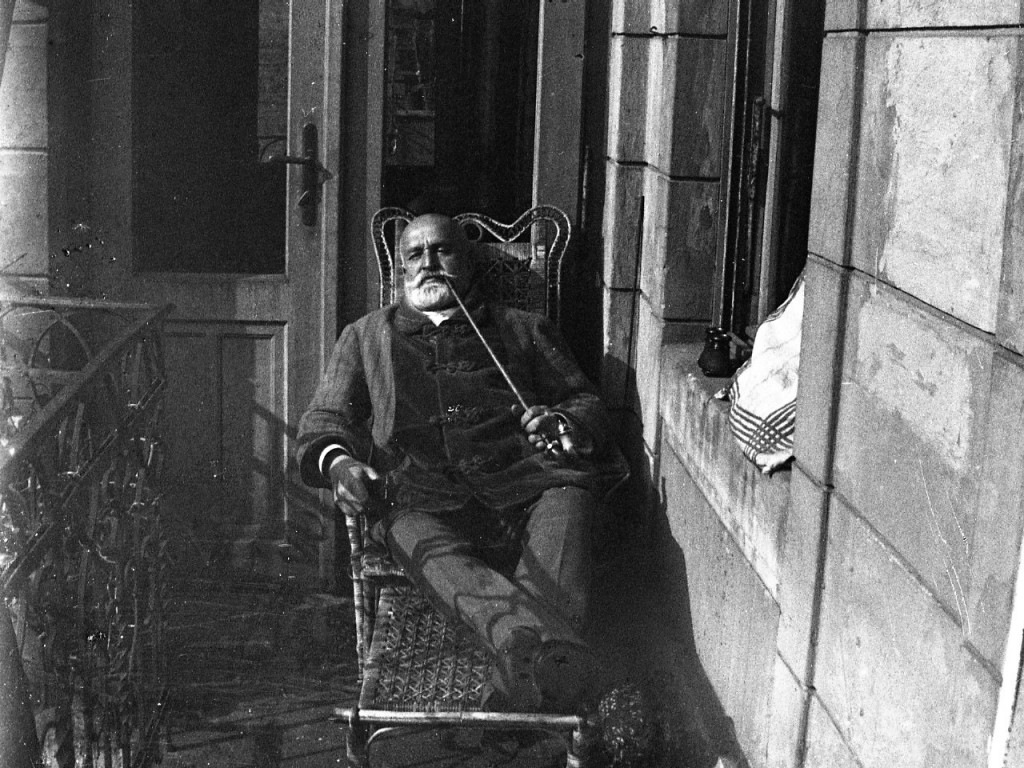PastOnGlass.com features vintage photos taken by László Isépy around Europe. 100 years later they now take us on a new journey of discovery. We are very excited to share with you this time-capsule, of a mostly calm and peaceful Europe – just before the devastating great-war.
Most of the glass slides and boxes are unlabelled – and we are very keen to learn more about Europe during this time – and invite you to help us identify any people or places found herein – If you recognise anything – please post a comment on the images page, or contact us.
The Glass Slides are mostly 45mm x 107mm and are scanned at around 800 DPI – Higher quality scans can be viewed by request.
All images on this website are protected by copyright, and are offered only for personal or educational uses. For commercial use of any images please contact us.

In the Farkasréti cemetery, a catafalque was set up, and around the catafalque stood a detachment of hussars and a detachment of bohemians.
This afternoon they buried László Isépy, the last gallant of the peacetime era, a true lover of life, who waited for New Year’s Eve to once again pay his respects to the jubilant Life, and then left with one last cheerful jest on his lips.
Who was László Isépy? If I say he was a hussar colonel, I’ve said nothing. If I say he was a dear, warm-hearted, golden bohemian, I still haven’t come close. You had to know László Isépy. From early morning till afternoon, he was a soldier. A peacetime, dapper, shining Hungarian hussar. And when night fell, the colonel transformed into a bohemian.
If, in the quiet of the Fészek Club, joyful revelry erupted, it meant that László Isépy had arrived. Now, he wasn’t the colonel but Uncle Laci. For every artist, he was just Uncle Laci. Full of laughter, full of spirit, full of ideas, and full of heart. One can’t describe who he was, how he was. You had to know him.
He brilliantly combined the East and the West in himself. He felt at home among philosophers just as he did on the practice field. He adored Ady and the most modern literature as much as his uniform. And if you placed him in front of a painting or a sculpture, Uncle Laci’s critique could put the most knowledgeable critic to shame.
Whenever he entered a gathering, he brought exuberant life with him. The inexhaustible original humor, the gentlemanly, Hungarian gentlemanly chivalry, and the warmest human heart.
After the war, Uncle Laci retired from the military. But he couldn’t retire from life. In his apartment, he set up a modernly equipped carpenter’s workshop. In his dining room, he built boats of exquisite quality. In a third room, one found a photographer’s studio, and in the fourth, shelves reaching the ceiling, on which forty thousand photographs were neatly arranged in little boxes. All beautiful women from Budapest! Actresses and society ladies, but only women. Because Uncle Laci loved women and loved lovers. Eyes sparkled when he appeared in a gathering.
And in the best gatherings — for a few years — one could observe curious phenomena. Uncle Laci took out a tin box from his pocket, scanned the ashtrays, and put every cigar end into the tin box. The dignified hussar colonel collected cigar ends. Because Uncle Laci had a dear comrade. A hussar captain. He was careless, had to be discharged, and fell into bad ways. Everyone abandoned him, everyone turned their heads away from him, but not Uncle Laci!
From the pension, at most seven hundred cigars were possible. But the fallen captain loved tobacco. So, Uncle Laci collected cigar ends, wrapped them in a big box before Christmas, decorated the box with pine branches, added his two hundred cigars, and sent it to the fallen comrade.
This was Uncle Laci, who lived his sixty-eight years cheerfully, laughing, but never forgot those who couldn’t laugh.
And now he has left. By his grave stood a detachment of hussars and a detachment of teary-eyed bohemians. For his farewell, even the old Farkasréti put on festive white attire. The sky paid tribute to Uncle Laci with a magnificent confetti battle of white snowflakes, who on New Year’s Eve, amid life’s exuberance, saluted Life one last time and then quietly left so as not to spoil anyone’s New Year’s Eve.